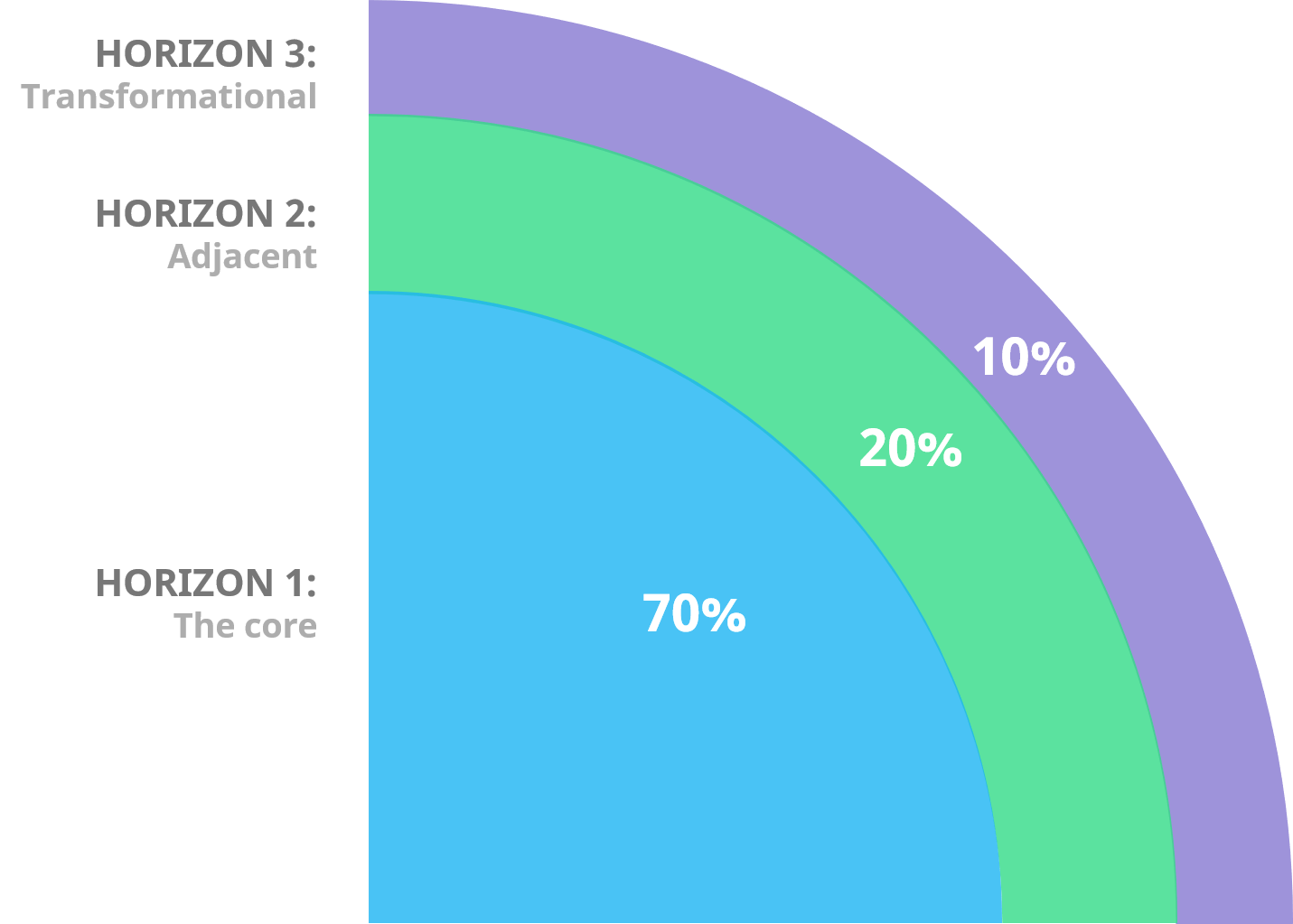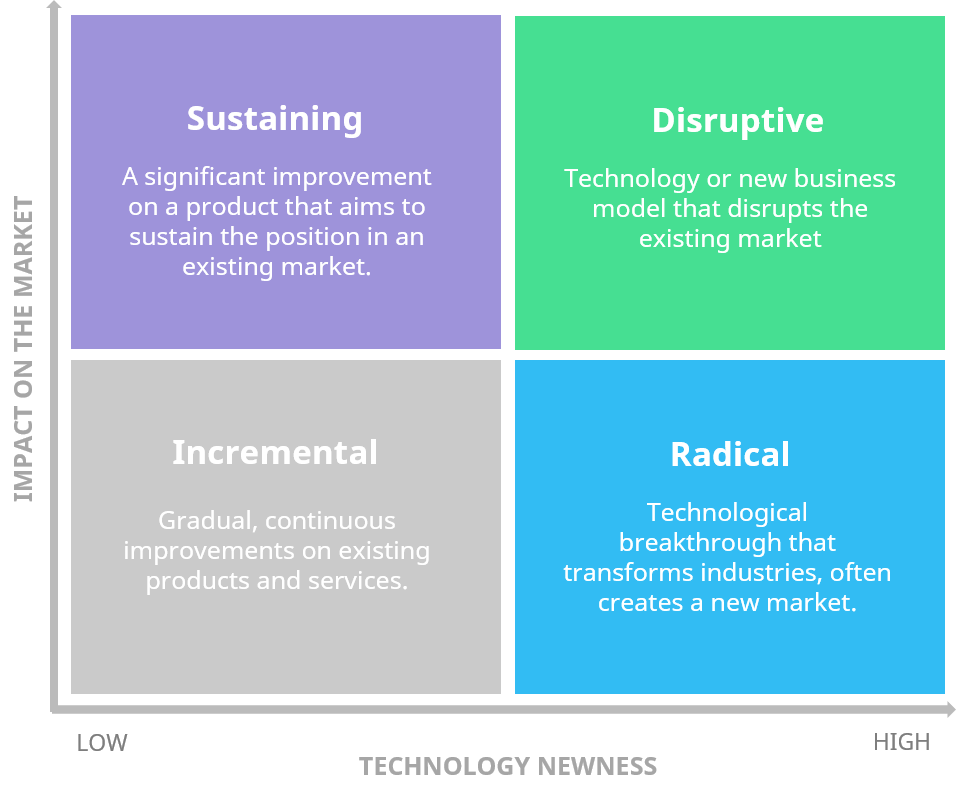What Is Innovation in Business and Why Is It So Important?
Even in our line of work, we often meet people who aren’t very familiar with innovation. As such, we often get to answer the question of what exactly innovation in business is, and why businesses should care about it.
Given how vaguely the term innovation is used, that is hardly surprising.
Also, while we’ve seen more and more industries being disrupted by innovation, there are still many industries that haven’t really been affected by innovation for decades, so these people haven’t necessarily had to deal with it during their professional career.
These factors often lead to these people mistakenly thinking that innovation is somehow exclusive to VC-backed startups, large corporations, and a number of top universities.
So, let’s dive in and look at these questions in more detail to help those who are new to innovation learn what it’s actually about.
Table of contents
What, exactly, does innovation in business mean?
To begin, we need to define what innovation is.
If you ask 10 different people how they would define innovation, you are likely to get at least 8 different definitions.
There’s a lot of debate around the topic, but at least in my opinion, most of it is just academic differences. Thus, it’s important for us to first demystify the word and clarify what we mean with it.
My personal favorite is the definition by Merriam-Webster. They simply refer to innovation as “the introduction of something new”.
Innovation is the introduction of something new.
Now, this isn’t just the same as simply inventing something new, such as a product like the iPhone, as it also needs to be launched and “introduced” to the world.
This definition also covers new products and services, but also improvements in many other areas, such as business processes or business models, which are key sources of innovation in their own right.
The role of innovation in business
Now, that we’ve defined what innovation means, we can take a look at what the role of innovation is, both for the society at large, as well as for individual businesses.
First, for the society at large, innovation is a key driver of economic growth. According to a Stanford University paper, roughly 85% of all growth that happened in the US economy between 1870 and 1950 can be accounted to productivity growth via innovation, and this isn't just an individual anomaly. According to the same paper, there have also been nearly identical findings in other economies in different times.

Thus, an individual business, clearly, would be foolish not to pursue these opportunities that account for 85% of all economic growth.
In the last few decades, we’ve seen a strong trend towards so called “winner take most” economies where a few companies are able to create superior market positions and take home the vast majority of profits in an industry, such as online search and computer operating systems.
What makes the situation worse for the rest is that these dominant players who are riding a wave of innovation and pursuing a market leading position are often able to undercut the entrenched competition in price, as well as prepared to burn a lot of cash to gain market share and drive the competition out.
To top it all off, we are also seeing a number of upcoming so called “innovation platforms” that are likely to drive unforeseen levels of market disruption virtually across all industries in the next couple of decades, as indicated by ARK Invest's research.

Source: ARK Invest, used with permission.
So, for a given business to grow, increase profits, or even survive in the future, it is very likely to need innovation to achieve any, let alone all, of the aforementioned goals.
How do businesses innovate?
Traditionally, innovation has been almost synonymous with R&D. The idea is that basic research leads to new inventions, which are then patented (if possible) and developed into commercial applications.
While there is still certainly a place for this kind of innovation, the Internet has fundamentally changed the game. Information, knowledge and cutting-edge tools and software are now available almost instantly and at a fraction of the previous cost in virtually any industry.
As a result, most innovation isn’t a direct result of commercializing basic research, as it once was, but is more often about applying existing knowledge, technologies, and resources to solve a given business problem.
In other words, it’s about putting the pieces of the puzzle together.
These days, innovation is mostly about putting the pieces of the puzzle together to solve a given business problem.
In practice, that’s probably easiest to explain with the help of the 70-20-10 rule for innovation made famous by Google.
Simply put, the idea is that roughly 70% of a company’s innovation resources should be aimed at incremental innovation of the core business, 20% to innovation that helps expand that core, and 10% to breakthrough innovation that can transform the future of the company.

Now these figures are obviously just a rule of thumb, but are still a great starting point on how to allocate resources to different kinds of innovation work.
So, even though most businesses don’t have the resources to compete with top universities and large corporations in foundational research, any business has plenty of opportunities for innovation. It doesn’t take millions of dollars to start to incrementally innovate around your customer service or automate internal processes.
Innovation is no longer about who has the most resources, but who is able to find the best solution to a given problem the market has, which actually doesn't have to be expensive.
This is further evidenced by the much higher success rate of "need seekers", or in other words, innovators who are focused on solving customer problems instead of following market or technology trends.
Examples of innovation in business
Now that we’ve established that innovation is both crucially important for the future of any business, and that it’s something that every business can do, let’s dive a bit deeper by looking at a few examples of the kinds of innovations that businesses could pursue.
As mentioned, there are different kinds of innovations out there. The easiest way to categorize them is by looking at the market impact and technology newness of an innovation.

Generally speaking, the more new technology an innovation includes, and the bigger of a market impact it pursues, the more likely the innovation is to fail. On the other hand, these kinds of innovations also lead to superior returns if they are successful.
Thus, a business that is new to innovation shouldn’t usually pursue these kinds of innovations unless they have their backs against the wall and have no choice since they simply don't have the experience or the skills to pull off such an unlikely feat, at least on paper.
It’s thus usually a much better idea for a business new to innovation to continue operating with proven technology, and in a market with known demand that they also happen to understand, while gradually building the capabilities needed to succeed in innovation.
Just like anything else in business, becoming good at innovation requires deliberate practice and investment.
Having said that, if your business is about to be disrupted, you really have little choice but to move as quickly as possible and go big by betting on transformational innovation.
However, even if you’re not aiming for these kinds of "moonshots" right away, it doesn’t mean that you wouldn’t be able to achieve a solid return on investment for innovation.

I’ve previously written a fairly extensive list of innovation examples that any business would be wise to pursue, but I’ve chosen to list a few of them below.
These are all forms of innovation that any organization could realistically attempt to pursue, even without much prior experience from innovation.
Process innovation
There are always plenty of business processes in every organization. Often these processes have been formalized, but there are usually also at least some informal processes.
These processes were all created for a reason but very few of them are perfect. For example, many of these processes probably haven’t changed, even if the underlying business has changed.
Thus, there are typically plenty of opportunities where even minor adjustments could lead to significant savings in cost or time. The beauty of addressing these low-hanging fruits is that the benefits start to compound quickly, which leads to a significant impact in the long run.

So, if you’re not sure where to start innovating, asking your employees how they’d improve the current processes related to their own work is an easy way to get started and gain some momentum for innovation. It’s virtually guaranteed to lead to useful improvement and is something everyone can relate to.
Incremental product innovation
Just like there is always room for improvement in business processes, the same applies for every product.
However, especially with product innovation, there will always be more ideas than you can implement. Thus, prioritization will be of the utmost importance if you’re looking to innovate around an existing product.
This is where a systematic idea and innovation management process comes into play and can really make all the difference.
Improved customer experience
Customer experience is one of the key areas that innovative companies are investing in.
With the added competition we’re seeing in nearly every market, a solid customer experience is simply a prerequisite for staying in business. Furthermore, a superior customer experience can even become a key competitive advantage.
The nice thing with customer experience is that there are typically a few major pain points and opportunities which can be quite easy to fix with the right kinds of innovation, and be enough to lead to measurable results.
What’s more, your front-line employees almost always have a pretty good idea of what these pain points and opportunities are, which is why it makes sense to involve them in the process.

Business model innovation
Where the aforementioned examples were all forms of incremental innovation, business model innovation typically has a more profound impact on the business, as well as the market in general.
You can innovate around your business model even if you sell the same products to the same customers, which makes it quite easy to pilot new business models without massive upfront investments.
These are naturally big changes, but if you’re able to find the right business model that complements your strengths, business model innovation can create a a strong and sustainable competitive advantage.
In the last few years, we’ve seen more and more industries adopt innovative business models, such as moving from selling individual products to subscription services and value-based pricing models. If you're looking for inspiration, this list provides you with a plethora of possible business models to consider.
Getting started with innovation
In the end, innovation is undoubtedly hard, and it comes with a significant risk of failure. Thus, it can be tempting to think that you can do without it.
However, an even bigger risk is not innovating. Without innovation, you are simply put guaranteed to go out of business, it’s just a matter of time.
While innovation is risky, not innovating is the biggest risk of all.
Just ask the traditional taxi industry that is fighting a losing war against ride hailing services, and eventually self-driving cars, or any of the companies that were bankrupted by the Internet and mobile revolutions.

The good thing is that anyone can learn to innovate. It can get complex at scale, but you can start small and gradually bite bigger pieces as you get better.
So, what are you waiting for? The sooner you start, the sooner you’ll reap the benefits and reduce the outsized risks associated with not innovating.
If you’re looking for more materials to help you get started, I’d recommend you start by downloading our innovation toolkit, and consider joining our Online Coaching Program, The Innovation System. The program will walk you through the process of making more innovation happen, step-by-step, results guaranteed!




